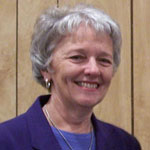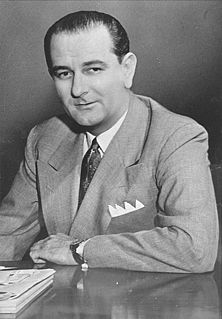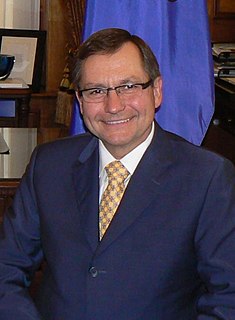
Alexa Ann McDonough, is a Canadian politician who became the first woman to lead a major, recognized political party in Canada, when she was elected the Nova Scotia New Democratic Party's (NSNDP) leader in 1980. She served as a member of the Nova Scotia Legislature from 1981 to 1994, representing the Halifax Chebucto and Halifax Fairview electoral districts. She stepped down as the NSNDP's leader and as a member of the legislature in 1994. She subsequently ran for, and was elected, leader of the federal New Democratic Party (NDP) in 1995. McDonough was elected the Member of Parliament (MP) for the federal electoral district of Halifax in 1997. She stepped down as party leader in 2003, but continued to serve as an MP for two more terms, until 2008, when she retired from politics altogether. In 2009, she became the interim president of Mount Saint Vincent University and was appointed an Officer of the Order of Canada in December of that year.

The Alberta Alliance was a right wing provincial political party in Alberta, Canada. Many of its members were supporters of the defunct Canadian Alliance federal political party and its predecessor, the Reform Party of Canada. Members also joined from such other provincial fringe parties as the Alberta First Party, the Alberta Party and Social Credit. Alliance supporters tended to view themselves as "true conservatives", and believed the Progressive Conservative government of Premier Ed Stelmach to be out of touch with the needs of Albertans.

Michael M. Fortier, is a former Canadian Minister of International Trade and a former Conservative senator from Quebec. He lost as the Conservative candidate for the riding of Vaudreuil-Soulanges in the 2008 Canadian election.
Lieutenant General Stanley Charles "Stan" Waters CD was Canada's first Senator to be appointed to his Senate seat following a non-binding provincial Senate election.

The Alberta general election of 2004 was the twenty-sixth general election for the province of Alberta, Canada. It was held on November 22, 2004 to elect members of the Legislative Assembly of Alberta.

Whitecourt-Ste. Anne is an Alberta provincial electoral district, located in central Alberta. The district is mandated to return a single member to the Legislative Assembly of Alberta using the first past the post method of voting. The district was created in 1993 from the old Whitecourt electoral district and Stony Plain and some of Barrhead.

The United States Senate elections of 1954 was a midterm election in the first term of Dwight D. Eisenhower's presidency. Eisenhower's Republican party lost a net of two seats to the Democratic opposition. This small change was just enough to give Democrats control of the chamber with the support of an Independent who caucused with them.

The Triple-E Senate is a proposed variation of reform to the current Canadian Senate, calling for senators to be elected to exercise effective powers in numbers equally representative of each province. This is in contrast to the present arrangement wherein individuals are appointed to the Senate by the Governor General, on the advice of the Prime Minister after which they generally do not interfere with the workings of the Lower House. The number of senators allotted to each province, as set out in the constitution, is neither equal nor proportional.
This is a list of members of the Australian Senate from 1987 to 1990. It consisted of twelve senators for each of the six states of Australia and two senators representing each of the Northern Territory and the Australian Capital Territory. All members were elected at the 1987 election following a double dissolution of both houses of parliament, rather than the normal case of only half of the state senators facing election.
The 2nd Alberta Senate nominee election was held in Alberta, Canada, on October 19, 1998, in conjunction with the Alberta Municipal Elections. It was held to elect Alberta's candidates for appointment to the Senate of Canada.
Betty E. Unger is a Canadian politician and a former member of the Senate of Canada, from Alberta, Canada from January 2012 until her retirement in August 2018 upon reaching the mandatory retirement age of 75. Outside politics Unger owned and operated a successful nursing services company in Alberta for many years.
The 2006 Alberta Progressive Conservative leadership election was held in November and December 2006 to choose a new leader for the Progressive Conservative Association of Alberta to replace the retiring Ralph Klein. Ed Stelmach emerged as the winner of an eight candidate field, despite placing third on the first ballot.

Alberta was, between 1989 and 2012, the only Canadian province to elect nominees for appointment to the Senate of Canada in a process known as an Alberta Senate nominee election. These elections were non-binding, as the appointment of Senators remained the responsibility of the Governor General of Canada on the advice of the Prime Minister. The process ultimately resulted in ten elected nominees, five of whom were appointed to the Senate. The legislation enabling Senate nominee elections expired in 2016, but two elected Senators still hold their seats.
The 2012 Alberta Senate nominee election, formally the 4th Senate nominee election of Alberta, was held to elect three nominees for appointment to the Senate of Canada to represent the province of Alberta. It was to be held in the fall of 2010, but was delayed by then-Premier Ed Stelmach. His successor, Alison Redford, announced that it would be held in conjunction with the 2012 provincial election, before June 1, 2012. On March 26, it was announced that it would be held April 23, 2012. The results followed the provincial election closely, with the Progressive Conservatives winning all three positions, and the Wildrose Party a close second.

Edmonton-Glenora is a provincial electoral district for the Legislative Assembly of Alberta, Canada. It is located north of the North Saskatchewan River in Edmonton.

Calgary-Glenmore formally styled Calgary Glenmore from 1957 to 1971 is a provincial electoral district in Calgary, Alberta, Canada. The district is mandated to return a single member to the Legislative Assembly of Alberta.

The 2019 general election in Alberta, Canada will elect members to the Legislative Assembly of Alberta. It will take place on or before May 31, 2019.

















